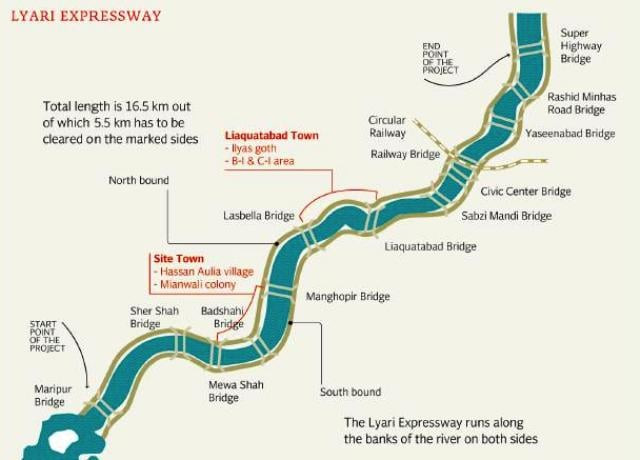Business cycle?: Sneaky new flats built on land cleared for expressway
Builders have quietly constructed housing along the land vacated by thousands.

Flats by the Lyari River, selling for up to Rs6 million, have sprung up on land ironically cleared of shanty huts six years ago for an expressway.
It is the classic example of government neglect bolstered by quiet political patronage in Karachi where land is always the underlying battlefield because there isn’t enough to go around.
In 2002, the government said it needed to build the 16.5km Lyari Expressway to ease the burden of freight trucks from inner city routes. But in order to make the road, nearly 150,000 people had to be uprooted from the riverbanks and resettled. It turned out to be the biggest ever displacement of its kind in Asia.
But today, the cleared land has been reclaimed by construction. Some builders have even cleverly given the flats names like Lyari Expressway Apartments I and II. Unless these flats are illegal, the Karachi Building Control Authority would have granted permission for them to be built. One official, Nadeem Ahmed Khan, said all of them were above board. “We issued them No-Objection Certificates after they submitted a master plan approved by the Sindh government,” he said. “Besides, what’s wrong with it? People who were removed were paid and given a plot even though they did not have the documents.”
But this explanation comes as cold comfort for the people who were forced to leave, whether they were living along the river bank illegally or had leased homes. These former residents were relocated by the government’s Lyari Expressway Resettlement Project that moved them to Karachi’s outskirts. Three of the resettlement schemes were in Taiser Town, Hawkesbay and Baldia Town.
“It’s very unfortunate that we have let this happen,” said one of the resettlement officials. “We promised the poorest people a better future in exchange for their shanties. Now, they see construction of new apartments on a piece of land, which was once said to be worthless.”
What burns perhaps is that the places where they were sent, have slowly gone to the dogs. Ansar Ali, who moved to Taiswer Town, said utility services were so bad that people were stealing electricity. “Garbage has piled all over,” he said. “I was better off in the slums because here you have to wait for days to even get water.”
This is corroborated by Shafeeq Paracha, who runs the resettlement project. “We don’t have the money to pay school teachers, sanitation staff and bear other maintenance charges,” he said. “Even I am not being paid my salary.” He has been after the government to set aside money in the budget for these colonies, which he says are on the verge of collapse.
“This was supposed to be a most remarkable example of a government-sponsored project,” he said. “We are turning into the worst disaster.” Paracha warns that the multinational lenders who finance infrastructure projects in the country will notice how the Lyari Expressway project was mishandled.
Aside from the resettlement and the fact that people have taken over land that was cleared, the actual expressway is in the doldrums. It was started in 2002 but deadlines were repeatedly extended, with the latest marked at 2013. Its cost has doubled to over Rs12 billion. Only one side is open for traffic, the other has yet to be built, because 4km have yet to be cleared. Resettlement compensation cases are bogged down in court.
The people who need to be moved now, in the strip that falls in Liaquatabad, Hasan Aulia and Mianwali Colony, are digging in their heels. They’ve seen what happened to the people who were uprooted. Advocate Shaukat Sheikh is fighting a case on behalf of some residents whose houses were demolished. He understands that the Liaquatabad residents are reluctant to leave. “None of [the earlier people] were compensated,” he said. “The government does not have the money. How can it promise to pay those who have decided not to move?”
Published in The Express Tribune, October 27th, 2011.



















COMMENTS
Comments are moderated and generally will be posted if they are on-topic and not abusive.
For more information, please see our Comments FAQ